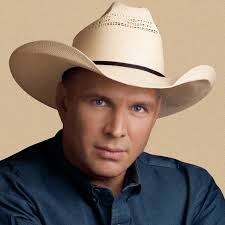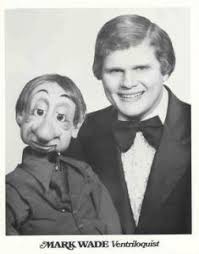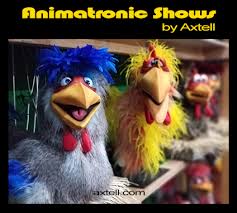Mark Wade...The Interview Part I
- david malmberg
- May 22, 2019
- 12 min read
Updated: May 25, 2019

Thirty some years ago I had a brief telephone conversation with Mark Wade. I don't remember the circumstances behind the call, but we did have a fine conversation centering around the craft. Both of our careers as professionals were just beginning. One of the things I noticed was his infectious enthusiasm for the craft. All of these years later, I found Mark to be the same gregarious personality he was in that first conversation. Of course, a lot has happened since then.
As a published author, he has become known as the Kidshow professional. He is a past “International Ventriloquist of The Year”, and has made appearances on nationally syndicated television shows, such as “Good Morning , America”, CBS Evening News, and “Entertainment Tonight”, to name just a few.
Uniquely, Mark was even a question on the network show “Jeopardy”. When the question was asked to name “America’s #1 Children’s Ventriloquist”, the answer was “Who is MARK WADE.”
He also serves on the Board of Advisors to Vent Haven and has been the Executive Director for the International Ventriloquist’s ConVENTion for many years.
All of these accomplishments are the byproduct of one thing: His total love and devotion to the craft. As Mark said to me, "Things have worked out well."
Here is Part I.
How does it feel to be known as “the great man?”
(laughter) A title I don’t know whether I richly deserve or not. It’s a joke that just kept on growing and growing.

Al Getler set it up with a Japanese lady who is a friend of mine. He brought her on stage and she said: “Mark Wade is a great man.” Getler said, “Who told you that.” She said, “Mark Wade.”
Al Getler
(laughter) I wasn’t in the room at the time and later all these people were walking down the hall and calling me a great man after that one session. I couldn’t figure out for the longest time what was going on until I talked with Getler and found out what was going on. (laughs)
So, Getler started the whole thing.
Well, from what I’ve been able to tell some people are serious about it and still are.
Well, I’ll take all the accolades I can get, but it started out as a good-natured joke. It’s all good. By the way, the Japanese lady is a friend of mine. She has had me over to Osaka, Japan to lecture and perform at her mini ventriloquism conference there.
How is the state of ventriloquism in Japan?
Actually, I think it is alive and well. They have huge ventriloquist clubs over there. At one time, one club had 1500 members. They have good attendance at their club meetings. It’s a little bit of a different system than we have here, but it is alive and well. I get posts all the time from Japanese ventriloquists about shows they’re doing.
Do you think the ventriloquism community in America is influential to communities in countries outside of the US?
I think so. Being a fairly large country, attendance by ventriloquists to the convention has been primarily by our own citizens. But, that is changing. This year, we have 15 – 18 countries represented and we are still getting responses from people who want to come. This year for the first time we received an email from a lady in Albania.

She said, “all these years we couldn’t come because we were a communist country and now that the Soviet Union has broken up we have more freedom. “ So I wrote her a letter. I have to write a letter of invitation to some of these countries so they can get their visas to come. I have to say for instance, it will benefit you and Albania to come to the convention to learn things and bring it back to the ventriloquists there. Yeah, I think we’ve have done our share for ventriloquism. We are the largest and oldest convention. We are at 43 years and counting. So yeah, it has worked out well all around the globe.
Is it difficult to seek out international talent?
Yes and no. The downside is that it is expensive getting them here. A lot of times they want to come anyway to become a part of our vent community here and learn from the best in the world of ventriloquism. So yes, they are willing to work with me on the price because I can’t afford to pay all the airfares from the different countries to get them here.
Do the international acts generally approach you or are you constantly on the lookout for new talent.
A little bit of both. I’ll hear from some people. I don’t start planning these conventions until September. I usually have the convention done by October, then we start advertising and taking early registrations. I currently have my eye on some ventriloquists that I would like to have come to the convention from other countries. I am looking at a lady from France right now, for next year. I’m going to talk to her after this one is over with. And, some other people too.
You started out as an elementary teacher. How many years did you teach?
3 years.
And, after three years, you made an abrupt transition from teaching to ventriloquism. Why did you feel that making that kind of a shift would work?
A couple of things. Being an elementary teacher back in the early 70’s , I wasn’t making a whole lot of money. I made more money on the weekends doing shows than I did all week teaching. Of course, I had my summers off, being a teacher. So I went to showcases for fairs and festivals, that sort of thing. Well when I was at one of the showcases I had a big booking agency approach me and say, “You’re better than the guys we have been hiring. Have you ever thought about doing it full time?” He offered me a summer contract making more money than I did the whole year as a teacher! So I took a leap a faith. Left the teaching career, my insurance, my healthcare, my salary and all that, left it all behind. Then I started working that summer and marketing at the same time. I was always looking ahead with my marketing. It worked out well. Almost a forty year career.

When you used the phrase, ‘took a leap of faith,’ what does that mean?
It is like pulling the band-aid off all at once. I didn’t do a little bit here or a little bit there and work my way in to it. I told my superintendent that I had this opportunity and I was going to take it. He said, “well, I’ll hold your job for a year.” I said, “well thank you and please do.” So, I kind of had a little bit of a safety net. But I went right into performance. It worked out well.
When an individual makes this kind of a choice in their life do you think a safety net is important or is the idea of just throwing yourself out there and not looking back instrumental in your success?
Well, I think what you have to do in order to go full time is to save five or six months worth of money to be able to pay all your bills. You need to save that money in advance and then while you're building up the number of shows you have, your bills are being paid for so you don’t have the pressure of having to get a show because you have a car payment coming up. It would be harder today with the way things are though. Not because of the economy, the economy is good, but it seems there are a lot of ventriloquists having a hard time making it right now for various reasons.
I was an opening act for eight years. I travelled with people like Garth Brooks, Reba McEntire and people like that.
Garth Reba
Most of that has disappeared. Plus, companies aren’t hiring like they use too. The school show market is down as well. I did those a lot.
With ‘no child left behind’ today, the new principals at the schools don’t even want to take the students out of class or anything. Not even for an educational program.
So, yes, I would hate to be getting started now doing what I did for 35 years.
When you started, did you know anything about marketing?
A little bit. My Dad and Mom owned a newspaper. So I had some experience writing copy and that sort of thing. Plus, I became a student of direct mail. Learned what colors work best, what wording works best, what day of the week to do mailings, what time of year to send things out. It wasn’t trial and error. A lot of what I did in terms of marketing was based on tried and true methods. So I got into all of that pretty quickly.

How has the digital age changed all of that?
There are still those who like to get material in the mail. In the early days you would send out a cover letter, a brochure and some kind of recommendation from somebody. Well, people don’t have that kind of time any more to sit and go through a whole package of that kind of stuff. It has to be quick and easy and catch their attention. Over the last few years I went to oversized postcards, talking about the show and what I could do for them. By the way, it is never about me, but what I can do for them. Then I would publish my postcard through the Principals Association and they would put it up on their websites.
That helped a lot.
Things have changed with digital. It is expensive to do direct mail. I like doing a combination of things. I use the internet a lot. I have client lists that I do mass emailings. That sort of thing.
You said, ‘it is not what you can do for me, but what I can do for you.’ Do you think that we are in the service industry?
Absolutely. We are all salesmen. By the way, I am doing speeches now on business and I do a little ventriloquism with the speech I do. I do Rotary’s and Kiwanis, those kinds of things. Whether we like it or not, we are all in sales. We sell ourselves every single day to our friends, our families, our spouses. So, yes, it is about what I can do for you.
Mark, you have devoted your life to ventriloquism.
I have.
What is it about the art form that merits that level of devotion?
Well, I got bit with the ventriloquism bug early. I checked out my first book on ventriloquism at the library when I was in 5th or 6th grade. It is something I always wanted to do. I started off with magic first. That wasn’t quite satisfying me. But, when I brought the puppet out, people perked right up and that took off. They said do more ventriloquism. I had audiences tell me that. So I thought I should do an all ventriloquism show and do a magic trick here and there to give my voice a rest. That’s how I did my shows. About, 95% ventriloquism and 5% magic.
You fall in love with the craft, the intricacies of puppet voices, the distant voice, the baby cry, which is one of my specialties. You just fall in love with the whole thing. I love Vent Haven. You can trace the whole history of ventriloquism with that museum. Think of this, I have been to every convention they have ever had. Even one convention before it was a convention. There was a meeting of people at Vent Haven.

Jimmy Nelson invited me down and I got to meet all the people when they were putting ideas together for the very first vent convention. So I have tried to be on the ground floor of a lot of that stuff. I like the puppets, I like the figures, though the last few years I have devoted myself to more soft puppets. I think that is a growing thing now. To be honest, some of the wooden puppets in the past all kind of looked alike. So, I’m glad for the variety today with soft and hard figures.
That’s interesting. I know you had a Jack Coats and a Don Bryan hard figure at one time. Both of them were really distinct in terms of their characters. Were you thinking about getting something really unique when you bought those characters?
Absolutely. I don’t want to offend any ventriloquists, but I did not want to have what I call a Charlie McCarthy knock off. You know, the cute boy figure on the knee. I wanted to get away from that. I knew that in marketing if you had something unique, people would come to you. So, I wanted to make sure I had something different. Don Bryan came to one of the early conventions, I saw him, I talked to him and he carved ‘Arthur’ for me.
I used him for a lot of years. Then I bought a Jack Coats figure from a guy. I didn’t talk to Jack personally, he had passed away by then. But the figure I bought from that guy had only been used one time.
Rudy Arthur
Just so you know, every time I see that Coats figure I salivate.
(laughter) It’s a beautiful figure. That was the original paint job too. Everything on it was original. The guy wrapped it up in tissue paper, set it up on the shelf and never used it. And now, I’ll make you feel even worse, I don’t want to but, I paid $250.00 for it. (laughter)
I think it was Bergen who said that if you don’t get bit by the vent bug by the time you're 12 years old, it’s not going to happen. Do you believe that?
Well, I think the earlier the better. It gives you a chance to find out what you want to do and where you want to go with it. You know, the voice changes by the time you're twelve or thirteen so you want to make sure that the puppet has the right voice. I think the earlier the better. Ventriloquism gets ingrained in you. Once that happens you can move forward.
In your experience have there been any periods of time when ventriloquism has fallen out of favor with the public?
I don’t think it has ever fallen totally out of favor. I think there was a time when there were no real venues on television for the craft. The Ed Sullivan Show was off the air, the variety shows waned, everything became situation comedy. Jay Johnson kind of broke that barrier with Soap and I think that helped to reintroduce vent to the public. I talked to a lot of pro’s during the day, Dick Weston comes to mind, and he said he would never do television.

I said, “why?” He said, “well, I honed a good piece of material. I can work my show in Las Vegas. People come to see me all the time. I don’t have to change my show except maybe to brush it up in a few places. I can go a lot of years with one show. I go on television and millions of people see it at one time and I have to start all over. “ So, a lot of ventriloquists in the day we're not wild about going on television.
Because of the media today, do you think a lot of ventriloquists are under pressure to continually change their act as opposed to ventriloquists of previous generations who had a single act that lasted a lifetime?
I think there is pressure to come up with new things for television. You look at some of the ventriloquists who were on America’s Got Talent and some of these other shows. They would offer their ‘A’ game, then they had a ‘B’ game afterwards. Sometimes the ‘B’ game wasn’t as strong as the ‘A’ game. That’s because they worked the ‘A’ game all the time. So yes, there is a lot of pressure to come up with something new. Bergen was amazing. He came up with a new show every week.
You would come up with a new show every year didn’t you?

Yes. For libraries and schools, I did, yes. I'm kind of semi-retired here in Florida so I’m not working as much, but that’s my choice. Yeah, I wanted to stay fresh. A couple of my elementary schools I did 25 years in a row. Some 20 years and many 10 to 15 years in a row. Primarily because I was able to reinvent what I did every year with new puppets and new routines.
Do you think the art will always be a vehicle for comedy?
I think so. There is a trend right now towards singing. The singing is fine, it is another branch of ventriloquism. The singers are popular right now because of Darci Lynne and of course Terry Fator. But, I also think it will come back towards the center again. You’ll see a combination of singing and comedy.
With technology, what innovations do you see coming to our craft?
I see more animatronics happening. Steve Axtell is doing some of that with his chicken puppets he made for some restaurants. Of course, if you look back at Stanley Burns, back in the day he had Dr. Lichi, a Chinese character that he manipulated by remote control. He was one of the very first to do that.
Dr. Lichi Axtell Chickens
One thing you have to be careful about though, the more animatronics you use, the more people will say, “well, he just recorded the voice.” We are going to have to be careful about that. There is a fine line between animatronics and craft. We don’t want people saying, ‘well that’s just another mechanical thing like Walt Disney and his hall of presidents.’
So, where does technology overtake art?
Well...(laughter) it’s a fine line we are walking. For most people, it is the entertainment value. If we can keep the entertainment value at what we do high, I think it will be fine in the long run. If we can provide that, no matter what we do, whether it’s a standard figure or one with all sorts of gimmicks, I think it will be a nice blend. It will just take a while to work all those things out.
I mentioned ventriloquism being a vehicle for comedy. But, I’m also reminded of Jay Johnson, The Two and Only or David Strassman with his dark comedy “Duality,” and it makes me wonder about the role ventriloquism might play in a serious theatrical setting.
I think in a limited way. We are still looked at by theater people as a bastardized art. A distortion of puppetry. We are taking puppets in a different direction. I think there will be a limited market for that. For instance, my friend Todd Oliver is doing a lot of small theaters in small towns. He is doing well with it. Jeff Dunham of course also presents in a theater environment. You’ll see a few, but not a lot.

Finis
Next week: Mark discusses new and upcoming talent, what they are doing right, what they are doing wrong, ConVENTion audiences, historical ventriloquists, his mentors in the business and legacy.
Salute!
D
Finis
© 2019 Swampsong, LLC










I definitely agree the "vent bug" either gets you by age 12 or never does!
At 69yrs old, I still have one!